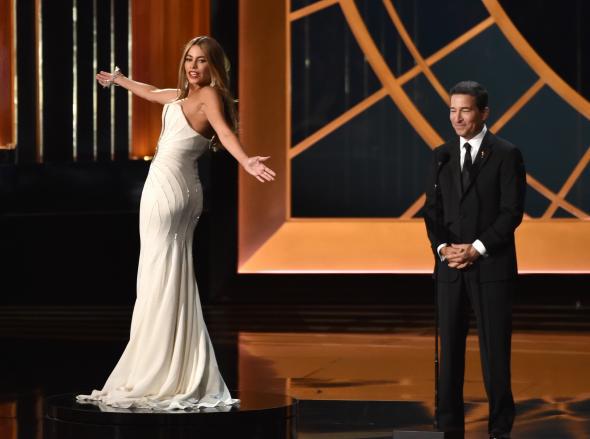The Emmy Awards started with a 30-second countdown, each second a clip from one of the television shows being celebrated at the ceremony. Getting pride of place—the last two seconds in the countdown—was Netflix, which brought the Emmys to liftoff with a kiss from Orange Is the New Black and then a shot of House of Cards’ Frank Underwood. Going into the evening, after all, there was an expectation that Netflix would win many—or at least one—award, marking the continued progression of fancy-shmancy, prestige, quality TV away from the networks and toward not only cable and premium cable but now streaming platforms as well. The night’s host, Seth Meyers, even stuffed his monologue with jokes about exactly this, mocking network TV for “having an awards show and giving all the awards to cable and Netflix.” But someone forgot to tell the voters that the networks weren’t supposed to win anything.
To get the logistics out of the way: Awards shows are too long. If the Emmys lasted two hours, they would be reliably—or at least more than sporadically—enjoyable. Instead, the show lasts three hours, and somewhere in that endless period of time someone is going to get the bright idea to put Sofia Vergara on a rotating dais so we can ogle her body and just for a second not be bored by another self-evidently boring part of an overly long and automatically dull-in-parts award show. And, as I mentioned when the nominations were announced, award shows are no fun if you greet them with calm and equanimity. To be reasonable about the Emmys is just another way of making them boring, and they are already mind-numbing enough. We would all be better off—well, all of us but the famous movie stars who are nominated in the over-stuffed miniseries and movie categories—if they just cut the run time.
And you know what does not help with the boring? The same people winning over and over and over again. It’s impossible to begrudge Julia Louis-Dreyfus or Bryan Cranston or Aaron Paul or Julianna Margulies their awards. Those actors are all excellent in excellent shows. But it is totally possible to begrudge Modern Family beating out, among others Louie, Veep, and Orange Is the New Black for Best Comedy, again. As the night’s awards kept going to people who have won already (all the aforementioned folks, as well as Jim Parsons, Allison Janney, Jessica Lange, Amazing Race—and that was before Modern Family and Breaking Bad started running the table), the show couldn’t help but feel staid, rerun-ish. Awards-wise, the most surprising part of the night came when Sherlock, a TV series, won awards for being a TV movie, and then Fargo started winning, its biggest award coming in a category that included Bonnie and Clyde, the less said about which the better. For True Detective to lose nearly every award to Breaking Bad is a perfectly fair outcome—Breaking Bad was a great show in its final season—but, gosh, wasn’t it refreshing to see a new face in director Cary Joji Fukunaga and his wonderful twin-set man-braids?
The predictable lethargy, the inevitable inertia of the Emmys and the parade of familiar winners obscured what was a very professional and adeptly delivered performance from Seth Meyers. Meyers is not a huge personality, and his opening monologue was a little understated. But many of the bits that followed were sharp. The Billy Eichner on the Street segment was, as with all things Billy, abrasive and great. Poehler and Meyers’ observation that Matthew McConaughey and Woody Harrelson are “two gentleman who seem like they’d be chatty in the sack” rang true. And a famous-people question-and-answer bit with Meyers even righted itself with a good bathroom-key gag.
Meyers’ steady hand and reliable charm was met with equivalent aplomb from the celebrity assembled. Bryan Cranston and Julia Louis-Dreyfus’ repartee and smooch were impeccably delivered (even if Louis-Dreyfus was banking on a win to make the gag possible). Harrelson and McConaughey exhibited exactly the chemistry that made them so riveting on True Detective. Billy Crystal’s Robin Williams appreciation was lovely and not too long or too maudlin. Good speeches were peppered throughout, from Modern Family director Gail Mancuso to Sarah Silverman. If Stephen Colbert’s imaginary friend bit didn’t quite work and Weird Al Yankovic supplied words to theme songs that don’t really exist—if Scandal has a theme song other than the clicking of cameras, it’s the only theme song that never, ever gets played—generally speaking, there were no giant whiffs, Vergara’s rotating aside. The jokes were simultaneously pretty funny and right in the bull’s-eye of completely appropriate.
But all of this—accomplished professionalism from accomplished professionals!—only contributes to the show’s overall air of boring boring boringness. Let there be disaster! Let there be controversy! Let there be other winners we can scoff at as endlessly as Modern Family! Instead, by the end of the night, the networks and basic cable had tied in their number of awards—11—while premium cable had taken home just four and Netflix none. (The streaming site did win a few Creative Arts Emmys, which were handed out on Sunday.) All in all, that’s a pretty fair allotment of prizes. But who wants to watch fair?
